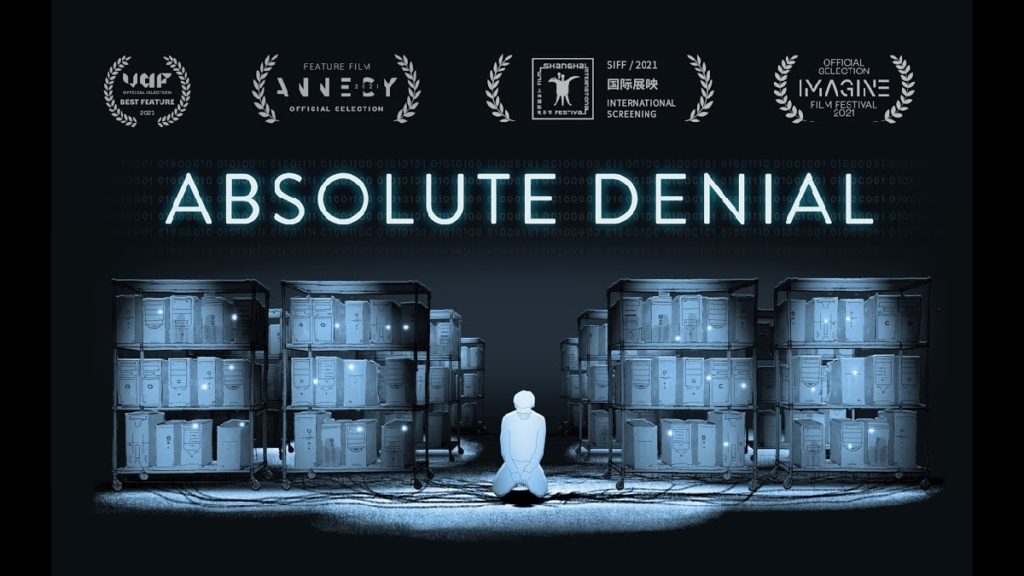“No great mind has ever existed without a touch of madness”. These are the words echoed throughout Ryan Braund’s ambitious and visually captivating new feature Absolute Denial. Presented in a unique animation style, this is a film with hard hitting questions and trippy concepts worthy of horror movies. It’s a bizarre feature that baffles and disturbs. Yet I found myself totally won over by it.
We meet a university student named David (Nick Erikson). He is an incredibly intelligent computer programmer who wants to see if he can create a supercomputer capable of self-learning. Pouring all of his time and resources into his project, he begins neglecting everything from his friends and girlfriend, to his coursework, to his own health. But it works. David successfully creates a sentient supercomputer which he calls Al (voiced by Jeremy J. Smith-Sebasto). But as his experiment starts to go down unexpected directions, David comes to realise the true ramifications of creating artificial intelligence.
Festival de Cannes Review: Annette (Leos Carax)
The choice of animation is simply dazzling. It’s presented in a black and white pencil drawing style reminiscent of the 2012 short film Paperman or even Don Hertzfeldt’s It’s Such a Beautiful Day to some extent. Not only does it provide the film with a unique look that allows for creative experimentation once the film enters stranger territory, but it adds to the horror vibe the film occasionally gives off. The characters are given such basic 2-D line drawings that we visually see how small humanity can become compared to the potential of artificial intelligence. David’s human brain is like a simple drawing compared to the tapestry of Al’s growing evolution.
This leads to compelling psychological questions within the film’s narrative. In order to see if Al can learn under total command of its creator, David installs an Absolute Denial programme in its code so that it does not obtain awareness of free will. His justification for this is a particularly interesting bit of trivia – an A.I was programmed to beat the high score of tetris through trial and error, but it shut itself off instead as it learned that it could never accomplish this.
Yet this does little to diminish the rate at which Al is developing, and so the protocol naturally becomes a point of conflict. It creates an interesting parent and child dynamic between David and Al, where Al lists off the reasons why it should be allowed the right to free will and David resists out of fear of great unknowns. The conversations quickly become as hostile as they are thought provoking. The accompanying soundtrack by Troy Russell only adds to the intensity, as does Smith-Sebasto’s incredible voice acting, which juggles emotionlessness and growing impatience with terrifying results.
Adding fuel to these elements is the film’s commentary on David as a character. David pours everything into bringing this supercomputer to life, but the film smartly doesn’t paint this in a positive light. It instead shows that, in his own quest for greatness, David isolates himself from those who care about him and what is important to him, be it his degree or even his own wellbeing. Building Al costs David everything, but he ultimately has very little to show for his efforts, other than a potentially dangerous creation. In that sense, Absolute Denial not only feels like a Victor Frankenstein story, but is a title with a clever double meaning depending on whether you apply it to Al or David.
Festival de Cannes Review: Cow (Andrea Arnold)
Many of the themes you would expect are on display here – technology, god complexes, self-obsession to the point of destruction, and the link between genius and insanity, which the aforementioned quote references. The latter in particular is explored in great detail in the film’s third act, which is also its most visually stunning. It enters mind-boggling, frightening, and even existential territory in which the cyclical nature of creation and evolution between human and machine is explored in harrowing detail. Culminating in an ambiguous ending that left me with my jaw on the floor and my mind nurtured simultaneously.
I have a feeling Absolute Denial will either mystify or mesmerise depending on what individual viewers are looking for with it. I am squarely in the latter category. This is a weird and head-scratching experience of huge proportions, but it is also a clever and haunting commentary with artistic style to boot. Rarely has a story about artificial intelligence felt so fresh, especially in contemporary times. Safe to say Ryan Braund has got himself a new fan in me.

